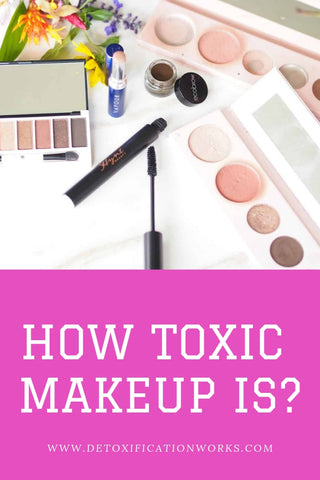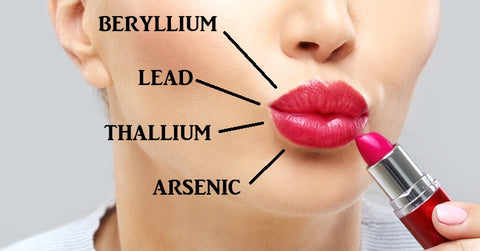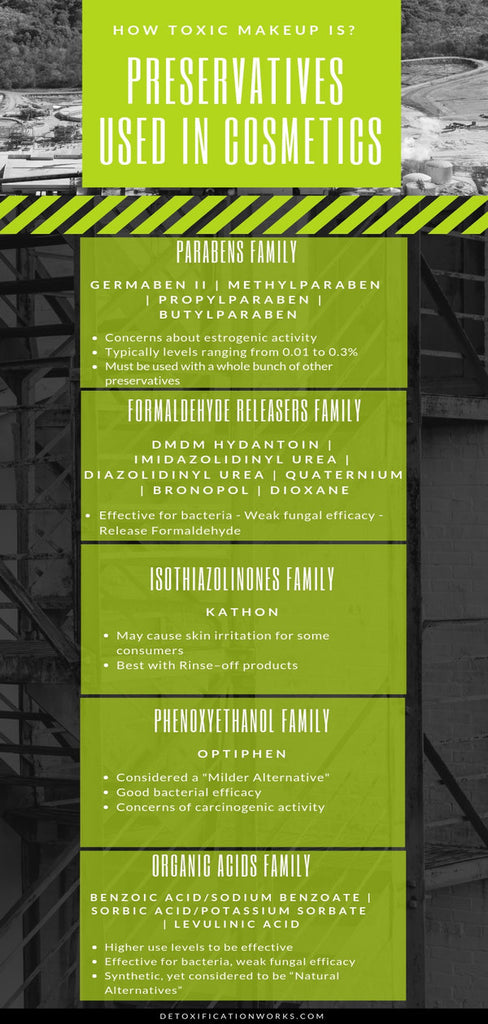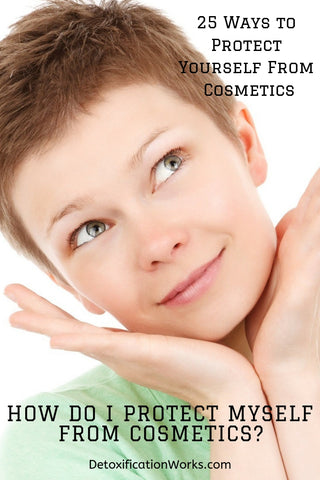How Toxic Makeup Is?
The truth is, no one really knows. According to EWG, the average American thinks the cosmetics they buy and use have been tested and approved by the FDA, which is not the case. According to EWG, the cosmetics industry is largely unregulated – In fact, it’s been more than 80 years now since Congress last updated the federal law designed to ensure that cosmetics are safe. The FDA does not even require the basic safety testing of ingredients in cosmetics before they are used.
The Europeans have taken action to protect their citizens from specific ingredients linked to cancer and reproductive harm, FDA still lacks the basic tools needed to ensure the safety of cosmetics and other personal care products.
Harmful Ingredients in Makeup
According to CBC News: “Some Claire's makeup products tested positive for asbestos, a mineral linked with cancer, the Food and Drug Administration said. The regulator warned consumers not to use the products, although Claire's disputed the findings. “.
EWG said, that FDA issued a “rare” alert today urging consumers to stop using certain talc containing makeups (foundations, concealers, powders of all sort) from national retailer Claire. The agency found 3 products tested positive for the deadly carcinogen.
We as consumers did not sign up for this, we are not all chemists and we don’t know what all these ingredients are, even if we tried. We might know a few, but every day new chemicals are being added, the list is getting longer and longer. According to EWG, the average women use an average of 12 products a day, containing at least 168 different chemicals. Men use fewer products, but still, put 85 chemicals on their bodies. Does this make sense? 168 different chemicals daily!? Really? This is crazy! What about all the food we eat, the air we breathe, there are toxins there too you know.
Again, according to the FDA “The law does not require cosmetic products and ingredients, other than color additives, to have FDA approval before they go on the market” so there is no point listing what ingredients are banned and what is not banned.
Chemical Free Makeup
Long story short, the is no such thing [we have not found any]. What’s a makeup without color, a binder of some sort, a filler, a thickening agent and oh, let’s not forget the most important ingredient, the preservative, preservatives are a must in makeups! Why? Because that’s what keeps them on the shelves for months and years to come before they get moldy and infested with fungus. Please keep in mind all the eye area makeups(mascara, eyeliner, eye gloss, eye glitter, eye shadows concealers for your eye area and more to come).
Preservatives In Cosmetics
Defined by MicrochemLab as “antimicrobial ingredients added to product formulations to maintain the microbiological safety of the products by inhibiting the growth of and reducing the number of microbial contaminants”.

Formaldehyde In Makeup
Formaldehyde Releasers Family is one type of preservatives in cosmetics; Formaldehyde-releasing preservatives are to ensure that the actual level of free Formaldehyde in the cosmetic product is always very low, yet enough to prevent any microbial growth.
Formaldehyde is a respiratory irritant that causes chest pain, shortness of breath, coughing, and nose and throat irritation, according to the ATSDR. It can also cause cancer. [ Cancer Classification: EPA: Probable human carcinogen, based on limited evidence in humans, and enough evidence in animals. IARC: Carcinogenic to humans. NTP: Reasonably anticipated to be a human carcinogen].
You might say, it might be a small quantity of Formaldehydes – which it is, we say, but what about the accumulative effect of day and night usage and the usage of an average of 12 products a day?? And other formaldehyde sources [pressed-wood products, cigarette smoke, vehicle exhaust and unvented fuel-burning appliances such as gas stoves] – it all adds up.
According to EWG “ The FDA has no restriction on the amount of Formaldehyde that can be present in cosmetics sold in the U.S”.
How Do I Protect Myself From Cosmetics?
You might ask yourself now, how do I protect myself from cosmetics? It’s a daily habit, we all use makeup every day, more products are coming out, the pressure of looking amazing all the time, really, how? 
25 Ways to Protect Yourself From Cosmetics
- Check the health ratings [EWG’s Skin Deep, Think Dirty, Goodguide.com]
- Demand more regulations of the cosmetics industry
- Keep makeup out of the sun and heat. Light and heat can kill the preservatives that help to fight bacteria
- Do not keep cosmetics in a hot car for a long time
- Don't use cosmetics if you have an eye infection (pinkeye)
- Throw away any expired makeup
- Never add liquid to a product unless the label tells you to do so
- Throw away any make-up if the color changes, or it starts to smell
- Never use aerosol sprays near heat or while smoking, because they can catch on fire
- Do not deeply inhale hair sprays or powders. This can cause lung damage
- Avoid color additives that are not approved for use in the eye area, such as "permanent" eyelash tints and Kohl (a color additive that contains lead salts and is still used in eye cosmetics in other countries)
- Be sure to keep kohl away from children. It may cause lead poisoning
- Don't drive and put on makeup. Scratching your eyeball can cause serious eye injury
- No sharing of makeup! Always use a new sponge when trying products at a store. Insist that salespersons clean container openings with alcohol before applying to your skin
- Keep makeup containers closed tight when not in use
- Minimize to eliminate cosmetics – unless necessary
- Read the Ingredients BEFORE buying, certain ingredients may cause a severe allergic reaction and may damage your skin permanently
-
Go Organic! switch to naturally formulated products [do your own research]
-
Eat healthier, move your body and drink lots of water! will help you to boost your immune system which will fight away all the toxins
-
Expired? Get rid of it! [mascara and Lip gloss expire after 6 months from the day it’s open, foundations, blushes, and eye-shadows after a year and lipstick get rid of it within 2 years]
-
Always avoid Fragranced anything! artificial added fragrance can cause major health issues (may contain Phthalates)
-
Use common sense! The longer the makeup stays on your face, the more harmful it could be. Since prolonged exposure allows the chemicals to seep deeper into your skin
-
Detoxify your body! Skin is the largest organ in your body [do your own research]
-
Think homemade cosmetics! made up of completely organic components and hence are chemical free.
-
Certified Cosmetic Products. [Products with certifications have proof that they have adhered to certain guidelines – do your own research]. Certifications to look for: COSMOS, Leaping Bunny Program, Nature, NSF/ANSI 305 and USDA Organic Seal.
Do you really still think makeup is safe? What about all the makeup made in different parts of the world, is it also safe? One can never tell. Tell us what you think. We'd love to hear from you.

Majdi Shahein | A Detox Specialist with Detoxification Works ®

Thanks ..makes sense.
I have a love hate relationship with makeup…
Thanks so much! Great info
Are you kidding? Really! I’ve always had my suspicions, I really don’t use much, a lipstick for sure, some eyeliner and some mascara once in a while. Thanks for the great info!
I always thought so…had my suspicions yes, Great article! Thanks a million!